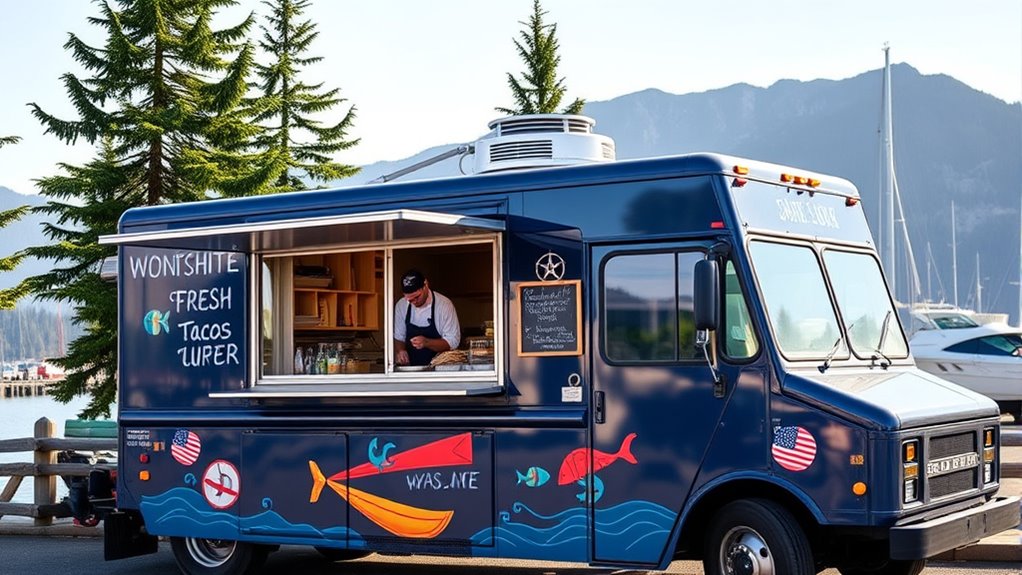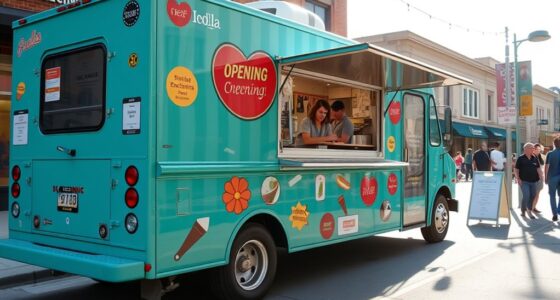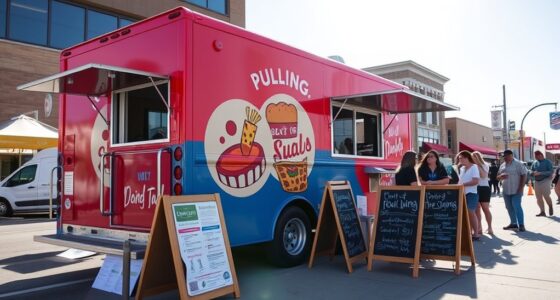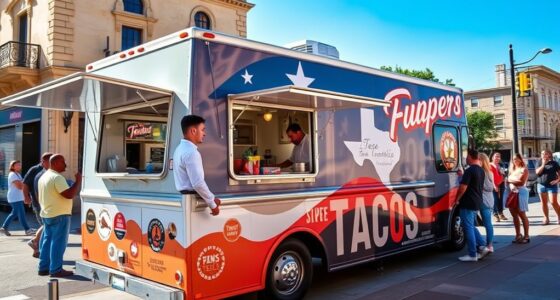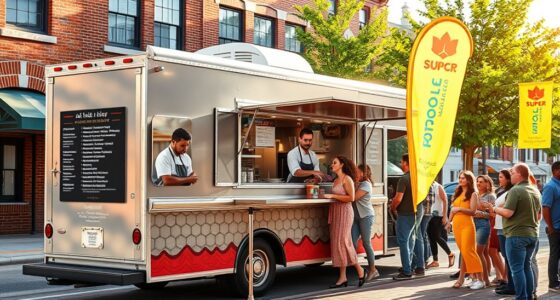To open a food truck in Sitka, Alaska, you need to secure permits like the CBS mobile food unit permit, pass health inspections, and hold valid licenses and insurance. Your startup costs will likely range from $40,000 to $120,000, including vehicle, equipment, and permits. Choose high-traffic locations, craft a compliant menu, and develop a strong brand through community engagement and marketing. Continuing your efforts will help you navigate the process smoothly and establish your truck successfully.
Key Takeaways
- Obtain necessary permits including CBS, Alaska DEC Food Establishment Permit, and liability insurance, and ensure health inspections pass.
- Budget $40,000–$120,000 for vehicle, setup, inventory, and $2,500–$5,000 annually for permits and insurance.
- Propose specific vending routes at popular or underutilized locations while complying with municipal zoning and placement rules.
- Develop a simple menu with food safety measures like HACCP plans, proper labeling, temperature control, and sanitized surfaces.
- Build your brand through consistent visual identity, community partnerships, social media marketing, and participation in local events.
Navigating Permits and Licensing in Sitka

Managing permits and licensing in Sitka is a straightforward process if you comprehend the requirements. You’ll need to submit a completed City and Borough of Sitka (CBS) application for a non-motorized food cart permit or an equivalent for mobile food units. You must hold a valid Alaska Department of Environmental Conservation (DEC) Food Establishment Permit and provide proof of a State of Alaska business license and food handler’s permit. A commercial general liability insurance policy is mandatory and must accompany your application. Your food unit must also comply with local sales tax laws. For mobile units, choose between FN-2 or FN-3 permits, depending on whether your unit is self-contained. Non self-contained units require a licensed commissary, while self-contained units can operate independently. Make certain your food unit passes health inspections and includes a Certified Food Protection Manager.
Estimating Costs and Fees for Your Food Truck Venture
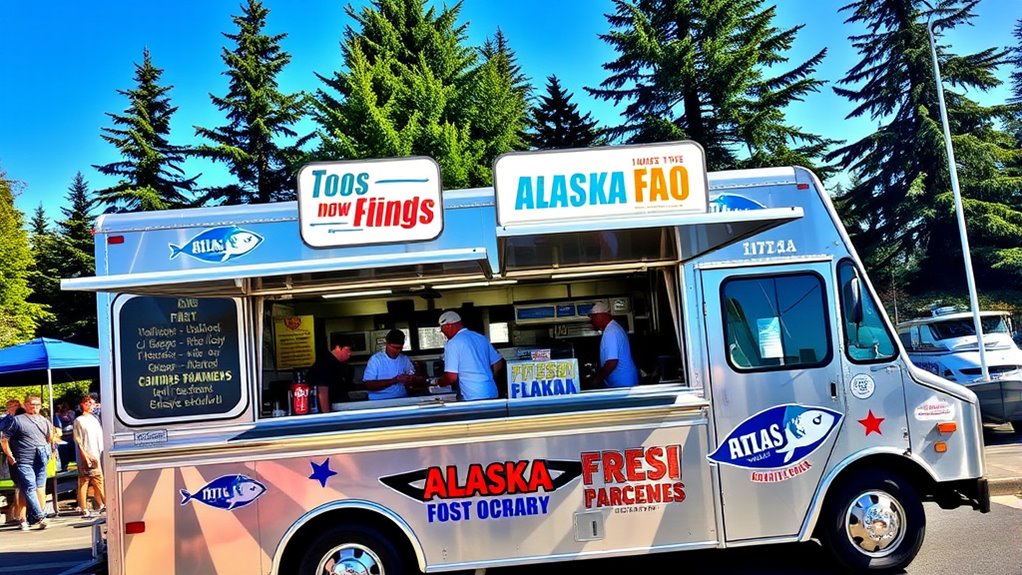
Estimating the costs and fees for your food truck venture in Sitka requires a clear understanding of both startup expenses and ongoing financial commitments. Your initial investment includes a vehicle, which can cost between $40,000 and $120,000 depending on condition and equipment. Kitchen setup—sinks, grills, refrigerators—must meet regulatory standards, adding to costs. Budget $3,000 to $5,000 for inventory and supplies, with extra for seafood-specific gear. Licensing and permits typically range from $500 to $1,500, while insurance costs are around $2,000 to $4,000 annually. Marketing expenses, including branding and social media, may total $3,000 to $8,000 initially. Monthly operating costs, covering fuel, maintenance, and supplies, can run $500 to $1,000, especially considering Alaska’s rugged environment. Understanding local regulations and compliance requirements is essential to avoid fines and operational delays, which can impact your overall budget. Additionally, industry trends can influence your menu and marketing strategies, helping you stay competitive in Sitka’s vibrant food scene.
Selecting Prime Locations and Ensuring Compliance
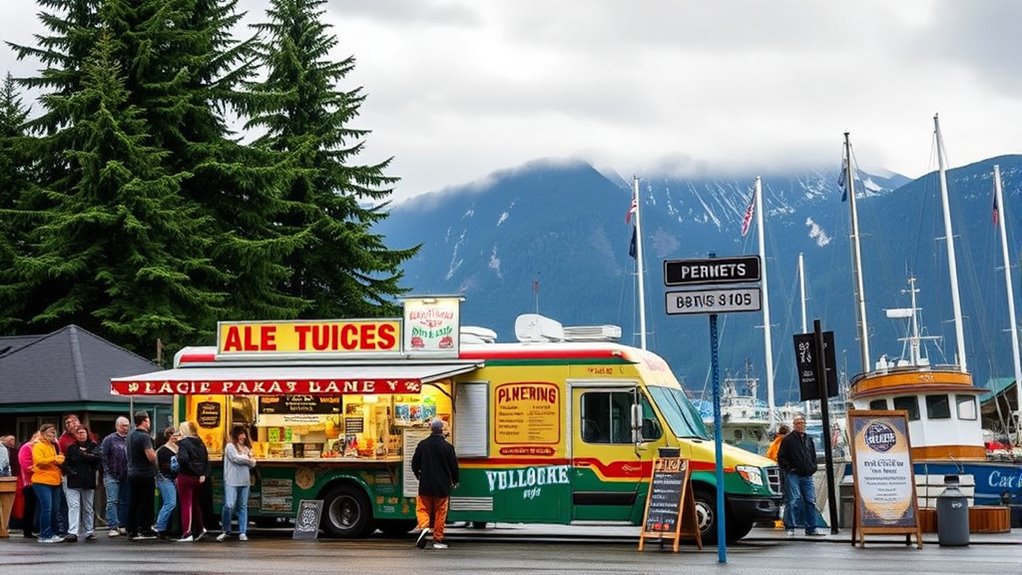
Choosing the right locations and guaranteeing compliance are crucial steps for your food truck in Sitka. You need to propose specific vending routes with detailed location lists when applying for permits. Popular spots include near Saint Michael’s Cathedral and existing vendors like Captain Juju’s, but use permits to access city property carefully. Avoid obstructing sidewalks or public pathways, as municipal codes restrict placement. Consider underutilized spaces like plazas or old structures for additional vending sites. Additionally, understanding local zoning regulations can help identify suitable areas that meet legal requirements for food truck operation.
Crafting a Menu and Prioritizing Food Safety

Crafting a menu for your food truck in Sitka requires careful attention to Alaska’s food safety regulations and local codes. Focus on simple, easily prepared dishes that fit within your mobile unit’s constraints. Incorporate a Hazard Analysis Critical Control Point (HACCP) plan for high-risk processes like smoking or curing, ensuring compliance with state rules. Your menu needs review and approval by the Alaska Department of Environmental Conservation or local authorities, so include detailed pricing and descriptions. Use dedicated hand sinks, maintain strict temperature controls, and regularly sanitize surfaces to prevent contamination. Favor low-risk items that require minimal handling, such as prepackaged foods or simple cooked dishes. Limit exposure of ready-to-eat foods, and clearly label allergens to meet safety standards while maintaining consistency across your offerings. Regularly assessing your menu and processes can help you identify areas for improvement and ensure ongoing compliance with food safety standards.
Building Your Brand With Marketing and Community Engagement

Building a strong brand for your Sitka food truck starts with creating a compelling identity that resonates with your community. Design visuals—logos, colors, and signage—that reflect your truck’s personality, whether quirky, rustic, or sophisticated. Keep branding consistent across all platforms, from menus to social media, and craft a story about your truck’s origins and unique qualities to build emotional connections. Use offline strategies like partnering with local businesses, participating in community events, and hosting tastings or giveaways to generate buzz. Leverage digital marketing by maintaining an optimized website, active social profiles, and engaging content such as polls and contests. Position your truck as a community hub, support local causes, and promote your catering services to expand your reach and deepen community ties. Understanding Your Market Building awareness among your target demographic and choosing high foot traffic locations will further enhance your community engagement efforts. Additionally, understanding the cookie policies and privacy preferences of your audience can help you tailor your online interactions to foster trust and compliance.
Frequently Asked Questions
How Long Does It Typically Take to Get All Necessary Permits Approved?
You’re probably wondering how long it takes to get all your permits approved. Usually, it takes about 4 to 8 weeks from start to finish. To speed things up, make sure you complete all certifications, insurance, and application steps early. Schedule inspections promptly, submit a complete package, and stay organized. Keep in mind, delays can happen if your applications are incomplete or if inspections are rescheduled.
Are There Any Restrictions on Operating Hours for Food Trucks in Sitka?
Think of Sitka’s rules like a quiet river, flowing gently but with clear boundaries. You can operate your food truck during street closure hours starting at 9 AM, but no late-night vending is allowed. The rules mainly hinge on street schedules, permits, and safety considerations. So, you’ll want to stick to daytime hours, respecting local permits and community safety, and you’ll find your path is smoothly guided by these gentle currents.
Can I Operate a Food Truck Without a Commissary in Sitka?
You can operate a food truck without a commissary in Sitka if your unit is self-contained and meets all safety standards. You need to demonstrate you’re capable of handling sanitation, water, and waste without external support. Make sure you obtain the proper permits, including a Non-Motorized Food Cart Permit, and comply with local regulations. Keep in mind, having a commissary simplifies logistics and sanitation, but it’s not always mandatory if your setup is fully self-sufficient.
What Are the Common Reasons Food Trucks Face Permit Revocation?
Think of your permit as the foundation of your food truck. Common reasons for revocation include operating without valid permits or licenses, which is like building on shaky ground. You’ll also face issues if you ignore health and safety standards, such as unsanitary practices or failing inspections. Disrupting public order, violating zoning laws, or not following city regulations can also cause your permit to be revoked, putting your entire venture at risk.
How Can I Find Affordable Commissary Options in Sitka?
To find affordable commissary options in Sitka, start by contacting local government offices or the Sitka Police Department for current listings. Network with other food truck operators for shared space opportunities, and explore online directories or local business listings for available kitchens. Attending food events and trade shows can also connect you with affordable providers. Remember, early inquiries and negotiations can help you secure the best rates and suitable locations.
Conclusion
Starting your Sitka food truck journey is an exciting adventure filled with opportunities to serve and satisfy. By balancing permits, costs, locations, menus, and marketing, you’ll build a bold brand that bolsters community bonds. Stay strategic, stay spirited, and let your passion for food and flavor flourish. With dedication and determination, your truck will thrive, transforming every turn into a tasty, timely triumph. Your Sitka success story starts now—seize it with spirit and style!
